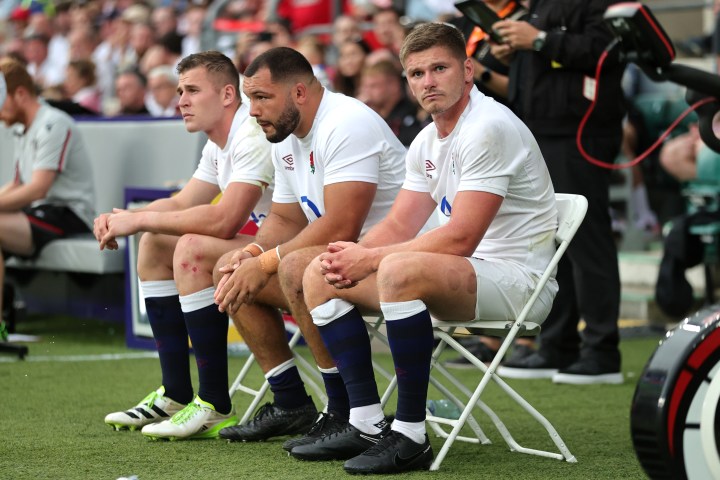ANALYSIS
England captain Farrell wins battle to overturn red card, but rugby loses the war to prioritise player safety

England captain Owen Farrell has avoided a suspension after his red card in Saturday’s 19-17 win over Wales was surprisingly overturned on Tuesday.
So, there we have it. Some players are untouchable and some countries have great wealth and access to the best lawyers – and player safety is not a priority, no matter how many promotional videos and campaigns say otherwise.
Drawing any other conclusion from the fact that England’s Owen Farrell escaped censure for smashing his shoulder into Wales flank Taine Basham’s face last week, is delusional.
Even if the incident were accidental – and that’s highly debatable – reducing the red card to yellow is an extremely contentious decision that will, in time, have huge ramifications for the sport.
Flyhalf Farrell was red-carded during last weekend’s Test against Wales at Twickenham for clobbering Basham in the face with his shoulder.
The only way Farrell was likely to evade a minimum four-week suspension was if the red card was rescinded and reduced to a yellow. To the sound of jaws hitting the floor across the rugby world, that’s exactly what transpired and everything that followed was mandated by the process.
In this instance, Farrell’s tackle struck Basham on the chin with force, with Farrell in an almost upright position. The Welsh player failed a head-injury assessment and could not continue.
Yet the all-Australian independent judicial committee of Adam Casselden SC, John Langford and David Croft came to a different conclusion based on a technicality that apparently only they could see.
The key factor, according to the committee, was this: “The Committee found that a late change in dynamics due to England number 2’s (Jamie George) interaction in the contact area brought about a sudden and significant change in direction from the ball carrier.
“In the Committee’s opinion, this mitigation was sufficient to bring the player’s act of foul play below the red card threshold.”
Watch the incident here and decide for yourself how much Basham changed his body height as a result of George’s actions. Also, note whether Farrell even tried to wrap his arm, as legal tackling would dictate.
It doesn’t matter which way you cut it, the committee has taken an extremely lenient view.
According to The Telegraph, “Farrell’s defence was led by Richard Smith KC, a veteran of five World Cups, three British and Irish Lions tours and described as the country’s ‘preeminent rugby barrister’. A profile of Smith on Chambers & Partners says he “achieves incredible results from seemingly impossible situations”.
World Rugby could appeal against the outcome, but that is an unlikely hope – even though it would send a strong message that it is serious about player safety.
Farrell was initially yellow-carded by Georgian referee Nika Amashukeli, but the foul play review officer (FPRO), in what is called the “bunker”, reviewed the matter. A few minutes later, the message came back from the FPRO to the referee with the instruction to elevate the yellow card to a red.
Farrell was subsequently charged with dangerous tackling, which carries a six-week, mid-range sanction for any hit that makes contact with a player’s head. Farrell has also previously served three suspensions related to dangerous tackling.
During the hearing, Farrell even admitted to “committing an act of foul play”, according to a statement from the independent judicial committee. Yet he has escaped any punishment.
Inconsistency
World Rugby might talk about player welfare as a priority, but when it comes to doling out punishments equitably, there is woeful inconsistency.
In recent weeks, Tonga’s George Moala received a 10-week ban for a bad tip tackle against Canada. It’s quite a harsh punishment, but it sends a strong message against potential neck-breaking tackles.
Japan’s Lappies Labuschagne received a three-week suspension for a clash of heads when playing against Fiji. Again, that looked far more accidental than the Farrell incident. But it was a red card and he received a suspension in line with the lower range of the sanction, which is fair enough. It also seemingly cost him a place in Japan’s World Cup squad, as he was omitted from the lineup this week.
Last year, Bok flank Pieter-Steph du Toit was red-carded and suspended for striking French centre Jonathan Danty in the head, even though he was pushed into contact by Bok No 8, Kwagga Smith.
See the incident here
Despite Smith pushing Du Toit off balance, that was not considered a mitigating factor in the subsequent hearing and Du Toit was banned for three weeks.
But England bad boy Farrell has had a red card rescinded thanks to the considerable skills of the Rugby Football Union’s (RFU’s) legal counsel and a lenient decision by a disciplinary panel.
As a consequence, he escapes any form of ban despite a chequered disciplinary record and is free to play.
“The player acknowledged that whilst he had committed an act of foul play, he denied that the act was worthy of a red card,” a statement from the committee said.
“After reviewing all the evidence, questioning the player in detail and hearing submissions from the player’s representative, the Committee concluded that the Foul Play Review Officer was wrong, on the balance of probabilities, to upgrade the yellow card issued to the player to a red card.
“The Committee determined, when applying World Rugby’s Head Contact Process, that mitigation should be applied to the high degree of danger found by the Foul Play Review Officer.
“On that basis, the Committee did not uphold the red card and the player is free to play again immediately.”
Discrediting the ‘Bunker’
What’s staggering is the following: “The Committee believe it is important to record that no criticism is made of the Foul Play Review Officer (FPRO), nor would any be warranted,” the statement continued.
“Unlike the Foul Play Review Officer, the Committee had the luxury of time to deliberate and consider, in private, the incident and the proper application of the Head Contact Process.
“The Committee believes this is in contrast to the Foul Play Review Officer, who was required to make his decision in a matter of minutes without the benefit of all the additional material, including hearing from the player and his legal representative.”
It simply undermines the purpose of the “bunker” where the FPRO is in a separate location, free of influence from the crowd and local broadcasters, with eight minutes to assess a yellow card and decide whether it needs to be upgraded to red.
And this statement seems to suggest the FPRO needs to consult legal counsel in-game to decide on an upgrade to a red card. It’s ludicrous.
Furthermore, World Rugby’s Law Calibration Committee, made up of players, coaches and refs, has made it clear that the onus is on the tackler to be better.
This outcome appears to have only considered the actions of the ball carrier and not those of the tackler. Their next meeting should be interesting.
It’s unclear where this will end, because one day, sadly, someone is not going to get up from one of these “tackles” and then it will be too late.
Farrell, England and the RFU have won the immediate battle. But in the struggle against head injuries and player safety, rugby has taken a huge step towards losing the war. DM




















 Become an Insider
Become an Insider
Great article Craig. However I believe you failed to mention the blatant cheating that the rugby public (and I only mean those that have eyes) can clearly see.
I think your follow up article reeks of nationalism. I am neither defending Farrell nor questioning the rules of rugby. However a non-partisan independent committee reviewed and reached a conclusion on the field referees’ decisions. There is obviously a fine line between instant physical reaction and blatant foul play. If this had been a South African player, I can only imagine the level of defensive, hypocritical hysteria. Perhaps time for some reflection on commentators bias?
Peter, he is writing, with a hint of sarcasm, on behalf of rugby safety, not on behalf of South Africa. Go to Irish Times, Guardian, Telegraph. Rugby writers around the world are amazed at the verdict. It’s about as “non-partisan” as Bernard Laporte’s campaign to host the 2023 world cup…
Have you even looked at the match and the recording? It would seem not. The only excuse that Farrell might have had is if he was high on drugs but even that is an offence that carries some sanction. The decision from the panel was disgusting and that is it even the UK media agrees on this so unless you can put forward a plausible excuse for a reduction from the six weel minimum I think your response is completely misplaced as was the deicsion of the review panel.
I agree, Peter. South Africans are known throughout the rugby world as great players but with supporters who invariably blame the match officials when decisions do not go their way. Farrell is a lightning conductor to SA rugby supporters.
This has nothing to do with South African blaming match officials. The vast majority of sports journalists around the rugby world are astonished by the outcome. Farrell has a history of foul play and this is no different. And he always gets away with it. I don’t wish ill upon anybody. But I’ll certainly crack the top off a beer if Farrell bows out of the RWC with a nice injury to illustrate karma.
Excellent writing.
Let me just say that Farrell is ‘n vuilgat- finished and klaar. The record and his appearance will prove this.
But he is a lucky vuilgat. The record will also reveal this .
The less said about the pathetic and embarrassing disciplinary committee the better.
Another BBBS (Big Boys Benefit Society) result. So long as the RFU maintains their superior position so will there be multiple approaches to refereeing our game. Was this not what Rassie was fighting against?
Cue the next Rassie video to highlight a few indiscretions…
Utterly gutless. Shameful.
Anyone who thinks it is only South Africans having a problem with the panel’s decision should read the article by former England coach, Sir Clive Woodward, on the Daily Mail’s website.
World rugby Control is a joke,money money ,money.How does the tonga guy get a 10 week ban,but spoilt brat(need a snot klap by bakkies botha)Farrel ,England pet mascot favorite get free
There is someone bigger behind this like may be Billy Beaumont in his position as Chairman of the Council and of the Exective Board. Anything for the king and his colonies. Those Aissies will soon get MBE’s or such.
It seems that World Rugby may appeal the decision, something they very seldom do. Even if it doesn’t end up changing anything, it would be good if World Rugby shows that they are aware of this extremely dodgy business.
Farrell is a serial recedivist and has got away with this type of tackle time and again! He is also a bad sportsman who can’t accept defeat. This was quite clear in the medal ceremony in the RWC 2019 where England came second and South Africa first. He refused to wear his silver medal! He definitely doesn’t know what rugby values at this level of the game are! He should be banned for all the illegal tackles he has committed, and there is video evidence to prove this. What a disgrace!